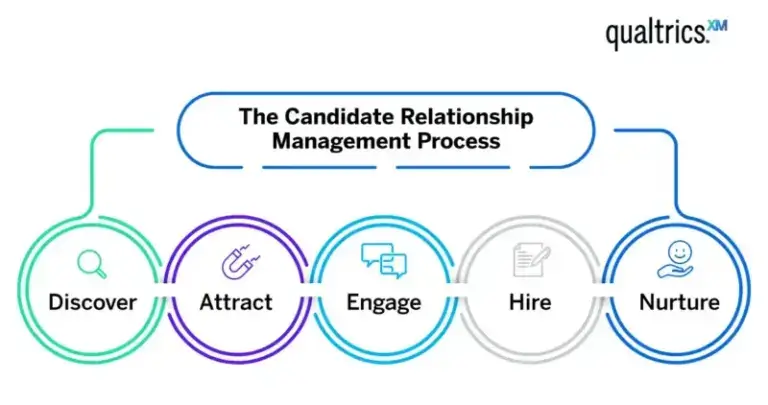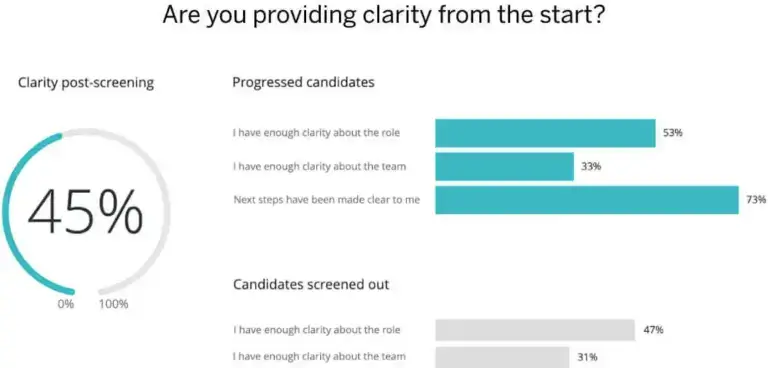“Today’s candidate that you turn down may be tomorrow’s candidate, or maybe tomorrow’s client or some other connection.” says Jay Meschke. So it pays to treasure every candidate, successful or not, and keep that connection going. You can do this with candidate relationship management (CRM).
What is candidate relationship management?
CRM is a strategy that recruiters use to nurture their candidates and manage their experience and relationships with them. It’s the sum of all the interactions a candidate has with you as a potential employer, across the whole recruitment cycle, from job ad to interview to hire (or not) and beyond.
It’s crucial that you manage all candidates well using a candidate relationship management system. For those who join your company, your candidate management sets the tone for their employee experience – how engaged they’ll be and how well they’ll perform. For those who are not successful, you’ll leave a good impression that may make them want to reapply and recommend you to other people.
What is a candidate relationship management system?
A CRM system is a software that’s populated with all your candidates, active and passive, and everyone who has previously applied for a job with you. It’s a comprehensive talent hub. It includes all the recruitment marketing tools you need for your social marketing, building talent pools, nurturing prospective employees, and catching the attention of passive candidates.
A good CRM software system can improve the recruitment process, by:
- engaging candidates through marketing campaigns
- highlighting previous applicants
- automating most communications to early-stage prospective candidates
- sending notifications when candidates of interest engage
- moving highly engaged prospective candidates progressively though your recruiting stages
A CRM system is different from an applicant tracking system (ATS), which is a tool, often required by compliance, that manages each applicant for a specific position along their application journey. An ATS is often coupled with a CRM system.
Get started with our candidate experience survey template
Why is CRM so important?
Gone are the days when recruiters hired a person for a job, then dismissed all the unsuccessful candidates, never to be heard from again. Enlightened recruiters cultivate a ‘talent pipeline’ – a candidate pool of potential employees who may be:
- Current employees who are promotion prospects
- Active candidates who are qualified and ready to fill a position
- Former candidates who narrowly missed out on a hire
- Freelance and gig workers
In a tough job market, organizations can dip into that pool to re-engage with talent from previous recruitment efforts and maybe hire for those hard-to-fill vacancies. And you will strengthen your brand equity as you get a reputation for being a caring, inclusive employer.
What are the benefits of a good CRM system?
- Save time and money – CRMs automate tedious, repetitive tasks and handle communication with candidates
- Get data-driven insights into your recruitment process – A CRM enables you to measure important metrics, such as source of hire effectiveness and careers page bounce rate
- Introduce the company culture as forward-thinking and employee-centric
- Reach out to great people you already know who may be laid off from other companies’ mergers or restructuring
- Demonstrate you value good talent and are willing to recognize and nurture it
- Identify where talent might be dropping out in your recruitment cycle
- Analyze demographics of your candidates to ensure diversity and inclusion
- Improve candidate experience, which leads to candidate engagement
- Make faster contact with candidates (both actives and passives)
- Gather more detailed candidate profiles
Implementing the 5-point CRM process with 5 handy tips
There are five strategic stages of the candidate relationship:

A good CRM system will be able to help you at each stage:
1. Discover
This is where you find your future candidates through various channels. Your CRM system will highlight which recruitment channels (job boards, social media recruiting, LinkedIn) are most suitable to use. Profile your candidates, based on their resumes, assessments, and interactions. Then, run new positions through your CRM system to see which previous or passive candidates it brings up.
2. Attract
In today’s job market, you need to get your vacancies and opportunities out there, and being noticed by top talent. Promotion of your employer brand, corporate social responsibility (CSR) and ESG (environmental, social & governance) initiatives, and PR events will raise awareness of job opportunities. Now is the time to reach out to passive candidates you identified on the CRM system to notify them of upcoming events and positions.
3. Engage
Don’t just leave candidates hanging in the ether – engage with them. Continuous candidate engagement is crucial for your CRM process. Automation comes into play here: personalized, regular, transparent communications (email, SMS) about candidates’ applications, notice of interviews and honest feedback if they were not selected.
4. Hire
This is where you choose the best candidate for the job. Your employer brand, expressed through your CRM, employee value proposition (EVP), and your knowledge of all candidates, helps both parties know what they’re getting into. Some CRMs use a ranking system to rate candidates’ skill sets and cultural fit. Candidates feel nurtured in the process, and you also have a well-vetted talent pipeline to choose from.
5. Nurture
You want to keep good relationships with all applicants. Just because a candidate didn’t get this job, it doesn’t mean they won’t get another one. And you want to build your talent pool.
Best practices for candidate relationship management
CRM systems can have so much automation that it’s easy to forget that, ultimately, you are dealing with real people. Thus, best practice is based on emphasizing the human experience:
Acknowledge every candidate
It takes 3-4 hours of someone’s life to complete a job application. Yet 65% of people say they rarely, if ever, receive communication about their application status. Candidates with poor recruitment experiences are more likely to leave negative ratings on employer sites such as Glassdoor. Make it your mission to communicate personally and regularly with every applicant.
Bring some humanity into the process
Everyone deserves basic courtesy. While most people accept a ‘thanks for applying’ to an initial application, once people have been through some interview rounds they deserve to be ‘courteously declined’. Providing feedback, suggestions for developing skills or experience, and/or an honest assessment of the candidate’s chances of being considered for another role, all make the process much more human.
Keep the door open
It’s estimated that only around 25% of talent managers stay in touch with unsuccessful candidates. Sure, it would be hard work to interact with everyone on a personal level. But your CRM system can do much of this contact for you when adding all your candidates to it as a talent database. And platforms such as LinkedIn offer a way to keep in contact effortlessly.
Top 10 best candidate relationship management software packages
Candidate relationship management software packages are recruiting solutions that give candidates personalized experiences to improve engagement during the hiring process. Recruiters and HR teams use these candidate relationship solutions to keep their talent pipeline engaged, making it easier to provide qualified candidates for open positions.
G2.com has released its list of the best candidate relationship management software for 2023. To qualify for inclusion in their Best Candidate Relationship Management category, solutions must:
- Build qualified talent pipelines for current and future positions
- Simplify and streamline the application process
- Track and manage candidate engagement throughout the recruiting process
Here’s what G2.com has to say about its Top 10:
1. Bamboo HR
‘An all-in-one experience that removes inefficiencies. Automate key functions, tasks, and integrations all with a single source of data. Collect and track signatures electronically to streamline your people operations in a fast, organized, environmentally conscious, and painless way for everyone’.
2. Greenhouse
‘…drives engaging candidate interactions at every touchpoint, eliminates administrative burden and keeps everyone on the hiring team engaged. Greenhouse also leads the industry in diversity, equity and inclusion (DE&I) tools, helping to mitigate bias and create a fairer hiring process.’
3. Sense
‘Sense’s automated communication and engagement technology powers the next generation of great recruiting teams. From 2-way texting for recruiters to NPS; from redeployment to candidate engagement; Sense is the only all-in-one solution built for recruiting.’
4. Lever
‘Lever is the only platform that provides all talent acquisition leaders with complete ATS and robust CRM capabilities in one product, LeverTRM. The LeverTRM features allow leaders to scale and grow their people pipeline, build authentic and long-lasting relationships, and source the right people to hire.’
5. Qualtrics Employee Experience
‘Qualtrics® EmployeeXM® is the leading solution for transformative and modern employee experience management. Qualtrics delivers relevant, actionable and easy-to-understand insights to HR, senior leaders and people managers, enabling them to improve engagement, streamline talent planning, bolster productivity, boost retention, and drive innovation.’
6. Hireology
‘Hireology is the only applicant tracking system built for sourcing, engaging, and hiring talent at multi-location businesses. The platform equips HR and business leaders with the support and tools they need to attract better quality talent, fill open roles faster, and make data-driven hiring decisions.’
7. 100 Hires
‘User-friendly Applicant Tracking System: Free plan, Gmail & Calendar integrations. Attract, interview & hire the best candidates faster. Used by startups, SMBs, and big companies. Create your resume database: resume parser, csv import, duplicate detector. Send bulk email campaigns. Schedule and conduct interviews, feedback reminders for interviewers.’
8. SAP SuccessFactors
‘Strengthening the connection between HR and business operations to help organizations create a sustainable workforce and profitable business. By spanning core HR/payroll, talent management, HR analytics/workforce planning, and individualized employee experiences, SAP SuccessFactors Human Experience Management (HXM) suite helps both employees and companies be their best.’
9. Grayscale
‘…providing frontline HR and talent acquisition teams the platform and tools they need to deliver a frictionless candidate experience. Source, match, and hire faster with two-way, one-to-one and bulk texting, hiring hub, automation, scheduling, and more all seamlessly integrated into your ATS.’
10. Phenom Intelligent Talent Experience Platform
‘…seamlessly connects candidates, employees, recruiters, hiring managers, HR, and HRIS — empowering over 500 diverse and global enterprises with innovative products including Phenom Career Site, Chatbot, CMS, CRM, AI Scheduling, Video Assessments, Campaigns, University Recruiting, Talent Marketplace, Career Pathing, Gigs, Mentoring, and Referrals.’
How we can help
We know that candidate experience doesn’t just impact the quality of your talent attraction and hiring – it impacts your employer brand, the employee experience for those who get hired, and even organizational performance.

We’ll help you design and improve your candidate experience, to attract the best candidates and grow your talent pipeline, and tighten up processes around sourcing, recruiting, and interviewing talent – saving money.
You’ll receive insights into every candidate experience touchpoint that matters:
- any stage of the candidate journey to see what went well and the actions you need to take to improve the experience
- the data you need for every stage of the candidate’s experience, while making sure you’re not causing survey fatigue
- total control over how often, when, and how your candidates are contacted, based on your preferences
We know that candidate experiences differ from role to role and organization to organization. That’s why Qualtrics Candidate Experience Management Software is built to flex to your needs.
Get started with our candidate experience survey template